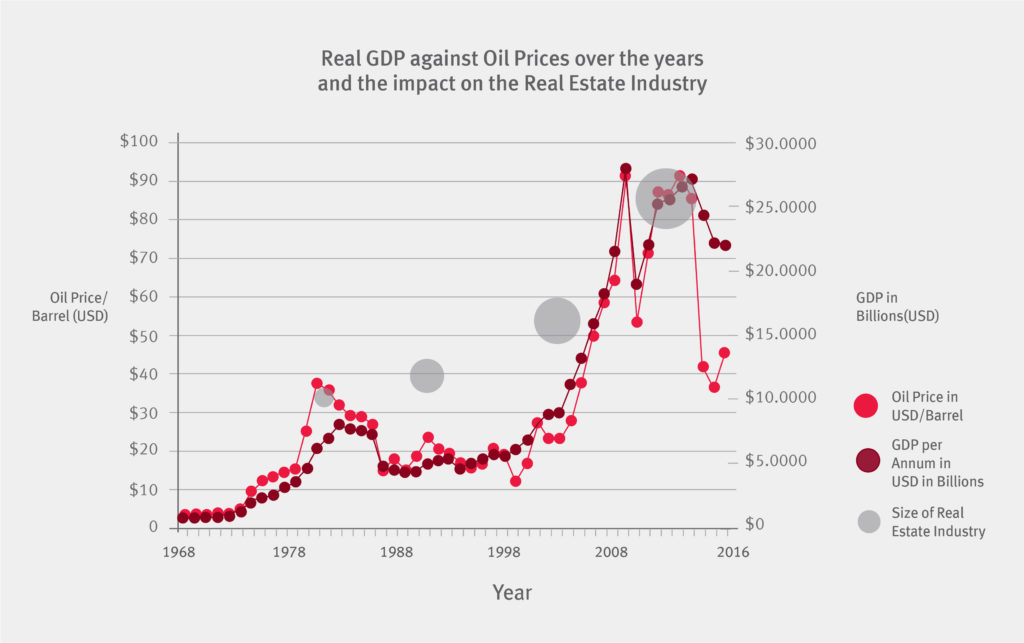Real GDP and Real Estate Over the Years: How the TT Economy has developed the Real Estate industry.
Being in the real estate business for over 45 years, both here and abroad, I have witnessed too many changes in the local landscape to discuss in one article. From the economy to advances in technology and the way we do business, Real Estate in this country has evolved from the 1960’s to today. The cyclical nature of T&T’s economy post-Independence has spurred waves of development, which have in turn stimulated a flourishing industry to what it is today.
Trinidad and Tobago is historically known as an oil rich country, with our economic growth and government spending pegged to the fluctuating price and demand for oil globally. But, in the 1950’s as the economy diversified into manufacturing and construction, we enjoyed steady GDP growth, averaging at 8% growth for the period, before the economy declined post-Independence. This, as well as other social factors prompted civil and political unrest in the late 1960’s, which came to a head by 1970. At this point, demand for property was drastically reduced due to a general lack of confidence in the country. Concurrently, the Real Estate sector was served by a few agents scattered around the country, with no real rules or regulations except for the standard commission being 5%.
Oil and Opulence
In 1973, fueled by the Israeli war, OPEC pushed for higher prices and by the mid-1970’s to 1980’s, oil prices increased from $3.60 USD/barrel in 1972 (already a high from $1.80 USD during 1968-1970) to a whopping $35.75 USD/barrel in 1981. Consequently, that decade marked a period of rapid development and superficial wealth in T&T.

Thus, residential sales exploded as Joe Public, replete with newfound wealth, began flipping properties thus becoming overnight millionaires. Of course, the Real Estate market followed this upward trend in development. Across the usual intersection of landowner/developer/real estate agent, business was transacted via word of mouth using a phone, a telephone directory, and a classified ad in the Trinidad Guardian. Sales were recorded in books, information shared amongst colleagues and no sale was secret. During this time, developments like Diamond Vale and Trincity came to market to satisfy the new demand for housing. The first townhouse and condominium complexes also came to market as a novel style of living in Trinidad. The Real Estate market was finally out of the starting blocks with the help of a few innovators, still well known names in property circles today.
“Money is no problem!’
However, even with the influx of money and wealth, T&T suffered from a systemic challenge of poor financial planning and of NOT saving for a rainy day. In the words of the late Dr. Eric Williams, “Money is no problem!” But money WAS our problem as oil prices plummeted in the early 1980’s and T&T tumbled into a deep, dark recession. During the years of 1983 to 1989, GDP fell by 30%.By December 1985, the Trinidad and Tobago dollar was devalued by 50%, in an attempt to increase export competitiveness. Added to this, a change in government administration in 1986 brought a shift in government spending and fiscal policies. Structural adjustment policies dictated by IMF were implemented to assist with the economic slump, but this was ill-timed for a majority of the population; new homeowners could not endure another burden on decreasing salaries. As a result, many homeowners returned keys for their properties and reneged on bank loans and mortgages. Some even fled the country in search of greener and more lucrative pastures abroad. It goes without saying that the Real Estate market took a hit as demand waned. Suddenly, there was a glut in the market. We were in oversupply.
1990!
The year of turmoil. As if Trinidad and Tobago could bear no more, the country stood still during the attempted coup d’etat on the ruling government. While it only lasted a few days, it further lowered buyer confidence in a market that was already undergoing a recession. Coincidentally, around the same time, the Association of Real Estate Agents (AREA) was being established by a few property movers and shakers to legitimize the industry as the entire country was in a state of reform. The Real Estate industry had grown from its infancy as AREA’s initial membership included 8 broker members and 25 salespeople.
Now, in its seventh year, this mammoth downturn continued until 1991, just before another oil induced boom began in 1994. By the mid 1990’s, with an average GDP growth of 3.7% T&T’s economy made an about turn and experienced another wave of development. As residential developments expanded throughout the country, so too did the Real Estate industry once again. Gone were the days of 5% commission and 3% was now the industry standard.

Construction Boom
By the early 2000’s, a “construction boom” struck the nation (also oil induced), GDP grew at an average of 10% per annum and savvy investors graduated from residential into the realm of commercial development. Thus, Real Estate in T&T revolutionized and became closer to what it is today. During this period of growth, 2000 to 2007, close to a dozen commercial buildings were developed in Port of Spain alone, increasing the supply of office space in the burgeoning capital. Many agencies were established around this time. In fact, established in 1999, Terra Caribbean Trinidad gathered a team of experienced property professionals as well as a commercial real estate team to navigate this expanding segment of the market.
While the global recession of 2008 to 2009 affected Trinidad and Tobago, it was short lived and mitigated by high oil prices, sustained throughout 2008 to 2010. Circa mid-2010, the three largest petrochemical companies in Trinidad and Tobago each acquired new land leases for gas and oil exploration which created a new demand for upmarket offices and warehouse space in the commercial segment and expat rentals in the residential segment. At this point, we began seeing renewed confidence in the real estate market. Again, Real Estate followed this upward trend in development and by 2012, there were over 500 real estate agents or agencies, which pushed the industry into fierce competition. Additionally, the advent of expansive websites, social media, and instant messaging apps has transformed the landscape of marketing and advertising. For end-users – the buyers and sellers that are players in this now dynamic market, the speed and accessibility of information are of utmost importance.
The Day of Reckoning
By the early to mid 2010’s, the local economic system benefited from an abundance of liquidity due to a domino effect of super inflated pricing in the petrochemical industry and government development projects. This time,

to implement anti-money laundering and combating the financing of terrorism policies; the Real Estate industry was cited as one of the sectors used as a conduit for crime, and quasi-regulatory measures have been implemented through the FIU. Under these policies, agents must be registered with the FIU and comply with their policies.
Beginning in late 2015, our volatile economy showed signs of another recession, again affected by a global slump in oil prices, which slipped to half of the price per barrel of the previous year. In response to this worldwide decrease in the demand for oil and by-products of oil, large corporations of the petrochemical industry downsized operations globally, as well as in Trinidad, leaving a void of vacant upmarket office space and empty expat rentals in their wake.
Today, just four years later, we are still recovering from this recession. As a result of dwindling earnings, foreign exchange reserves are now scarce and this has led to the depreciation of the T&T dollar. History repeats itself. Again, to mitigate the economic challenges, the present government of Trinidad and Tobago has implemented stringent controls through changes in the fiscal policies. But while this recession is not as horrific as the 80’s, we have seen many changes in our economy and the real estate market. Now with established segments catering to varied clients, the business of real estate is vast and agile and one must be on the pulse to succeed. In almost 57 years of this country’s Independence, Real Estate as a service industry is rapidly thriving, and we have come a long way and still have a long way to go to raise the bar in this Real Estate business.




